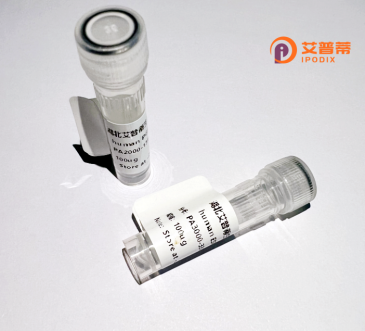
| 纯度 | >90%SDS-PAGE. |
| 种属 | Human |
| 靶点 | RASL11A |
| Uniprot No | Q6T310 |
| 内毒素 | < 0.01EU/μg |
| 表达宿主 | E.coli |
| 表达区间 | 1-242 aa |
| 活性数据 | MRPLSMSGHF LLAPIPESSS DYLLPKDIKL AVLGAGRVGK SAMIVRFLTK RFIGDYEPNT GKLYSRLVYV EGDQLSLQIQ DTPGGVQIQD SLPQVVDSLS KCVQWAEGFL LVYSITDYDS YLSIRPLYQH IRKVHPDSKA PVIIVGNKGD LLHARQVQTQ DGIQLANELG SLFLEISTSE NYEDVCDVFQ HLCKEVSKMH GLSGERRRAS IIPRPRSPNM QDLKRRFKQA LSPKVKAPSA LG |
| 分子量 | 27.0 kDa |
| 蛋白标签 | His tag N-Terminus |
| 缓冲液 | PBS, pH7.4, containing 0.01% SKL, 1mM DTT, 5% Trehalose and Proclin300. |
| 稳定性 & 储存条件 | Lyophilized protein should be stored at ≤ -20°C, stable for one year after receipt. Reconstituted protein solution can be stored at 2-8°C for 2-7 days. Aliquots of reconstituted samples are stable at ≤ -20°C for 3 months. |
| 复溶 | Always centrifuge tubes before opening.Do not mix by vortex or pipetting. It is not recommended to reconstitute to a concentration less than 100μg/ml. Dissolve the lyophilized protein in distilled water. Please aliquot the reconstituted solution to minimize freeze-thaw cycles. |
1. **"RASL11A: A novel tumor suppressor in prostate cancer"** - Zhang et al.
- **摘要**: 研究表明RASL11A在前列腺癌中表达下调,通过抑制RAS-MAPK信号通路和诱导细胞周期阻滞发挥抑癌作用,可作为潜在生物标志物。
2. **"Structural and functional characterization of RASL11A protein"** - Chen & Smith
- **摘要**: 利用X射线晶体学解析RASL11A的蛋白结构,揭示其RAS超家族保守域特征,并通过体外实验验证其GTPase活性调控机制。
3. **"RASL11A phosphorylation modulates its interaction with c-Myc in cancer progression"** - Huang et al.
- **摘要**: 发现RASL11A通过Ser45磷酸化与c-Myc结合,抑制后者的转录活性,进而调控结直肠癌细胞增殖和迁移。
4. **"RASL11A deficiency promotes vascular remodeling in mice"** - Wang et al.
- **摘要**: 构建RASL11A敲除小鼠模型,发现其缺失导致血管平滑肌细胞异常增殖,揭示该蛋白在血管稳态中的新功能。
RASL11A (RAS-like protein family member 11A) is a member of the RAS superfamily of small GTPases, which are pivotal regulators of intracellular signaling pathways. Unlike canonical RAS proteins, RASL11A lacks a conserved GTPase domain, suggesting divergent functional mechanisms. It contains a C-terminal region with a putative nuclear localization signal and a proline-rich domain, hinting at roles in protein interactions and subcellular trafficking. Initially identified for its differential expression in prostate tissues, RASL11A is broadly expressed in normal organs, including the heart, brain, and reproductive tissues.
Functionally, RASL11A is implicated in cell cycle regulation, differentiation, and senescence. Studies highlight its role in suppressing tumor growth by modulating transcriptional programs linked to cell proliferation and apoptosis. For instance, RASL11A downregulation via promoter hypermethylation is observed in prostate and colorectal cancers, suggesting potential tumor-suppressive roles. It interacts with transcriptional regulators like TLE1 and components of the polycomb repressive complex, influencing chromatin remodeling and gene silencing. Additionally, RASL11A is associated with vascular development and tissue remodeling, possibly through TGF-β signaling crosstalk.
Despite its emerging significance, RASL11A's precise molecular mechanisms remain under investigation, with ongoing studies exploring its dual context-dependent roles in cancer and developmental processes. Its therapeutic potential as a biomarker or target in malignancies and age-related pathologies continues to garner interest.
×